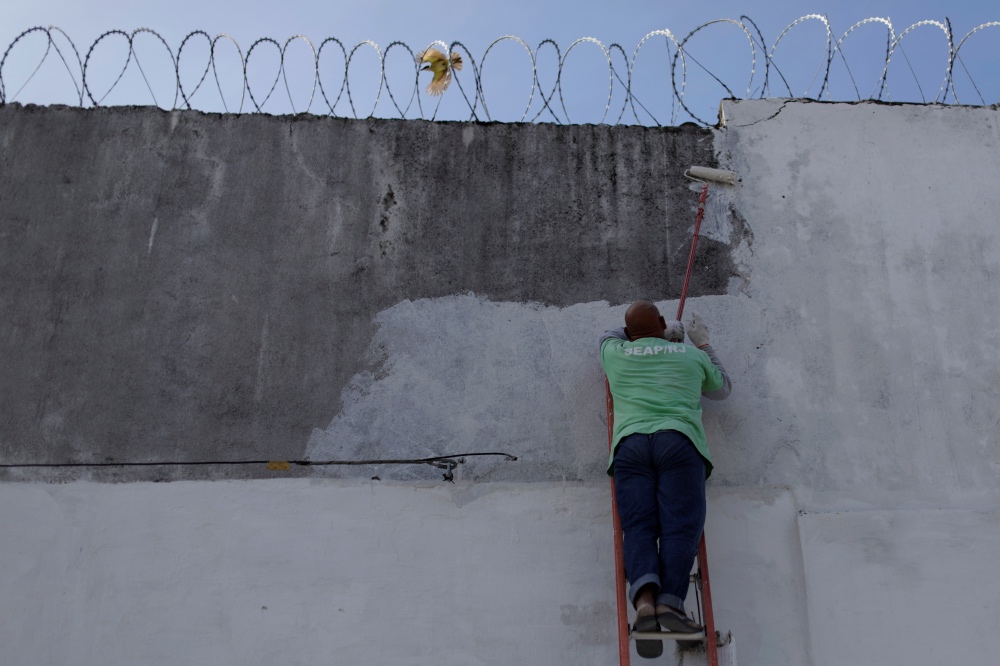
FABIO TEIXEIRA, of Thomson Reuters Foundation, reports from Rio de Janeiro…
Rio de Janeiro, Brazil
Thomson Reuters Foundation
Carolina, a Brazilian mother, hasn’t heard anything from her jailed son since March when authorities banned prison visits due to the coronavirus outbreak and she is scared.
As COVID-19 deaths rise in Brazil’s violent and overcrowded jails, activists have called for tens of thousands of prisoners to be released to stop the disease taking a heavy toll on inmates, most of whom are young black men like Carolina’s son.

A man paints a wall of the Bangu Jail complex, Gericino, Rio De Janeiro, Brazil, on 6th August, 2019. PICTURE: Reuters/Ueslei Marcelino/File photo
About 64 per cent of Brazil’s prisoners identify as black or mixed race compared with 55 per cent of the 210 million population, according to a 2017 prison census, which experts attribute to an excessive focus on policing of communities living in favelas.
In Brazil, where the poor struggle to make ends meet and adhere to social distancing during the coronavirus outbreak, thousands have taken to the streets in recent weeks to join a wave of global protests denouncing racism.
“It’s a desperate fear…it’s torture for us.”
– Brazilian mother Carolina, referring to the danger her 24-year-old son, serving 12 years in prison for armed robbery, is facing in prison when it comes to coronavirus.
“It’s a desperate fear…it’s torture for us,” said Carolina, who relies on scraps of information from a WhatsApp group for relatives of inmates at the Rio de Janeiro jail where her 24-year-old son is serving 12 years for armed robbery.
Brazil has the world’s second-highest COVID-19 death toll, with 43,332 fatalities so far.
Among its nearly 750,000 prisoners, 49 deaths have been reported officially, with the National Prison Department (DEPEN) saying last month that the rate of coronavirus infection in prisons was lower than in the general population.
But campaigners, including Rafaela Albergaria, from Rio’s State Mechanism for the Prevention and Fight Against Torture, an independent state body tracking rights violations in prisons, believe the real figure could be much higher.
“Testing is only being done on those who develop an aggravated condition and happen to be transferred to an emergency room,” Albergaria said.
The coronavirus crisis has again highlighted the acute overcrowding and sometimes squalid conditions in Brazilian jails, which are over-capacity by about 300,000 inmates, according to government data.
Since the pandemic began, some 30,000 inmates have been released, but experts want more non-violent offenders to be freed to help fight the spread of the virus.
“It’s very important that…we take measures to ease this overcrowding, for public health reasons,” Valdirene Daufemback, a former director at DEPEN, told the Thomson Reuters Foundation.
DEPEN said it has taken steps to improve sanitary conditions in the country’s prisons – sending in supplies of face masks, hand sanitisers and cleaning materials for guards and inmates.
Activists, however, point out that some states, instead of releasing inmates at high risk of becoming seriously ill, have built new cells to isolate those suspected of having the virus.
“Instead of prioritising release measures to drastically reduce overcrowding, governments continue to expand the system…maintaining mass incarceration and criminalization of black youth,” said Maria Clara D’Avila, an advocacy advisor from Black Initiative for a New Drugs Policy, a non-profit group.
Researchers said they were concerned that the real number of COVID-19 deaths was being covered up, pointing to a lack of testing and a spike in “excess deaths” in recent months.
In Rio de Janeiro state, which has the country’s second-largest prison population with more than 54,000 inmates, 57 inmates died between March and May – more than double what would be expected for the period, Albergaria said.
“And that number is probably higher, since deaths can take weeks to make it into the system,” she added.
Rio has officially reported 12 deaths from coronavirus in the state’s jails.
Without visits, prisoners’ relatives have to rely on hearsay from prison officers or from medical staff if sick inmates are hospitalised. Brazilian prisons seldom have pay phones.
Without visits, prisoners’ relatives have to rely on hearsay from prison officers or from medical staff if sick inmates are hospitalised. Brazilian prisons seldom have pay phones.
Many, like Carolina, are part of informal WhatsApp groups, sharing what little news they can gather with fellow relatives.
“They cry in WhatsApp groups. They pray. They get angry and curse,” said Maria Teresa dos Santos, president of the Association of Friends and Family of People Deprived of Liberty in Minas Gerais.
If anyone hears a prisoner has died, they send a group message.
That is the news that Carolina said she dreads receiving every day.
“The terror that we’re suffering…is making us sick,” she said.





